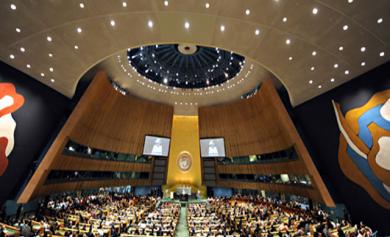
The United Nations’ General Assembly? opened its? annual session yesterday with a plea to members for cooperation in tackling issues arising from climate change as well as flash points around the globe.
?
“Moving forward the myriad of issues before us will require hard work, integrity, and partnership,” the Assembly’s President for its 66th session, Nassir Abdulaziz Al-Nasser of Qatar, told the meeting dedicated to the memory of Dag Hammarskjöld, who died in a plane crash in 1961 while trying to bring peace to? the Democratic Republic of? Congo (DRC).
“The sands are shifting. We have before us a unique opportunity to shape change and ensure that our next chapter will be safer for the most vulnerable, more prosperous for those in need, and kinder to Planet Earth,” the President said.
?
He outlined four main areas of focus for this year’s session. The first is the peaceful settlement of disputes, a need that has become more relevant and urgent than ever. “It is my view that the General Assembly should, through its revitalisation, become more engaged and empowered on issues of mediation, so that it can fulfil its role as the world’s pre-eminent peacemaker at this major juncture in international relations,” he said.
?
Turning to UN reform, Mr. Al-Nasser called for revitalising the Assembly’s work so that it remained efficient, effective and representative, especially in responding early to emerging crises, and for reforming the Security Council.
?
The Council, whose resolutions alone were legally binding while the Assembly’s were recommendations, has not changed in decades, with five permanent members with veto powers – China, France, Russia, the United Kingdom and the United States of America – and 10 non-permanent members without veto elected on a? two-year term basis. Formal talks to reform it have been under way for more than 18 years.
?
“There is no shame in recognising that after six decades our organisation needs reform,” Mr. Al-Nasser said.
On the third priority, improving disaster prevention and response, he cited the unprecedented surge of natural and man-made disasters. “Populations across the world are experiencing increased vulnerability, food insecurity, health and education crises,” he said and added that “to address these critical issues, we must enhance cooperation among various actors.”
?
In the last area, sustainable development and global prosperity, the President stressed the primacy of the UN Millennium Development Goals (MDGs), the eight ambitious targets set in 2000 that aim to slash hunger and poverty, maternal and infant mortality, a host of diseases and lack of access to education and health care, all by 2015.
?

